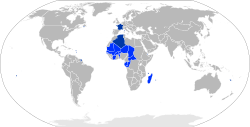
Back Французскае Супольніцтва Byelorussian Comunitat Francesa Catalan Francouzské společenství Czech Communauté française German Franca Komunumo Esperanto Comunidad Francesa Spanish Ranskan yhteisö Finnish Communauté française (Cinquième République) French Komunitas Prancis ID Comunità francese Italian
French Community Communauté française (French) | |||||||||||
|---|---|---|---|---|---|---|---|---|---|---|---|
| 1958–1995 (De facto: 1958–1960) | |||||||||||
| Motto: "Liberté, égalité, fraternité" Liberty, equality, fraternity | |||||||||||
| Anthem: "La Marseillaise" | |||||||||||
 The French Community in 1959 | |||||||||||
| Capital | Paris | ||||||||||
| Common languages | French | ||||||||||
| Membership | |||||||||||
| Historical era | Cold War | ||||||||||
| 4 October 1958 | |||||||||||
• Abolished | 4 August 1995 | ||||||||||
| Area | |||||||||||
| 1959 | 11,000,000 km2 (4,200,000 sq mi) | ||||||||||
| Population | |||||||||||
• 1959 | 150,000,000 | ||||||||||
| Currency | |||||||||||
| |||||||||||
The French Community (French: Communauté française) was the constitutional organization set up in October 1958 between France and its remaining African colonies, then in the process of decolonization. It replaced the French Union, which had reorganized the colonial empire in 1946. While the Community remained formally in existence until 1995, when the French Parliament officially abolished it, it had effectively ceased to exist and function by the end of 1960, by which time all the African members had declared their independence and left it.
The Community had a short lifespan because, while the African members did not refuse it, they refrained from real involvement. Under the appearance of equality, the constitution of the Community restricted the sovereignty of the twelve African states, and reaffirmed the preeminence of France, by placing in the domaine commun (exercised in common) critical functions such as foreign affairs, defence, the currency, economic policies and control of raw materials.[1]
- ^ Henry Grimal, La décolonisation de 1919 à nos jours, Armand Colin, 1965. Éditions Complexe (revised and updated edition, 1985), p. 335.

